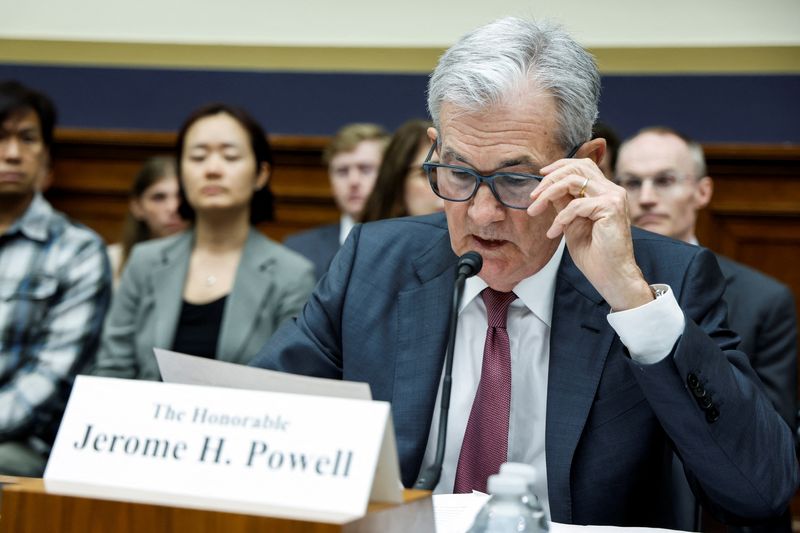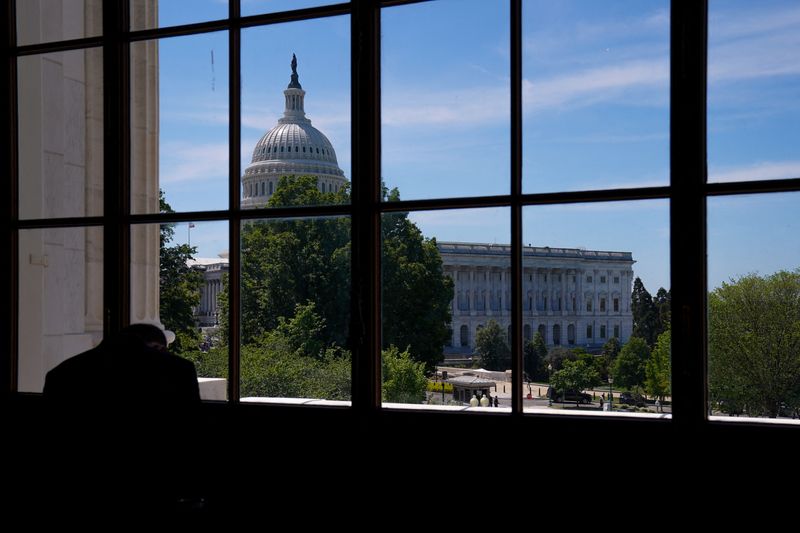By Howard Schneider
WASHINGTON (Reuters) -Further Federal Reserve rate increases are "a pretty good guess" of where the central bank is heading if the economy continues in its current direction, Fed Chair Jerome Powell said in remarks on Wednesday to lawmakers on Capitol Hill.
In response to a question late in a three-hour hearing before the House Financial Services Committee, Powell said he would not characterize the Fed's decision last week to hold interest rates steady as a "pause," and noted the fact that a majority of policymakers see two more quarter-point rate increases as likely by the end of the year.
"We didn't use the word pause and I wouldn't use it here today," Powell said. The outlook for two more rate hikes by the end of the year, included in the Summary of Economic Projections released by the Fed last week, "is a pretty good guess of what will happen if the economy performs about as expected,” Powell said.
Right now that is characterized by modest growth but a still strong labor market and only stodgy progress on inflation.
As Powell spoke, comments from other Fed officials showed the contours of the debate emerging at the central bank over whether further rate increases will, in fact, be needed.
Chicago Fed President Austan Goolsbee said at a Wall Street Journal forum that he felt the central bank was in a "wait and see" mode as further data come in.
"If you don't see progress, that is an answer, if you do see progress, that is also an answer," he said.
Atlanta Fed President Raphael Bostic, meanwhile, became the first policymaker to suggest the Fed would need to wait at least past its July meeting to decide on further rate increases, because acting too fast at this point could "needlessly drain" strength from the economy when inflation may continue heading down with monetary policy where it is.
"If we simply press on with additional rate hikes, we could needlessly drain too much momentum from the economy," Bostic said.
BANKING REGULATIONS IN FOCUS
The comments by Powell were his most explicit on the monetary policy outlook during a hearing dominated by questions from Republican lawmakers concerned that a string of bank failures in the spring would prompt the Fed to push back too hard on the financial sector with tougher capital and other rules.
"There are a number of proposals in the works. They have not been finalized," Powell told lawmakers who questioned why the Fed might consider forcing banks to raise more capital while at the same time saying that the financial system was stable, and that the failure of institutions like Silicon Valley Bank was largely the result of poor management.
Any change of capital rules or other regulations "would need to be shown to be justified," Powell said.
Powell said any changes "will take time," and should not impact the industry in the near term. The proposals "are still to some extent in motion...It will take quite a while to decide what to do" and years after that to implement, he said.
Nominees to three Fed board positions faced similar queries in a separate hearing in the Senate.
On monetary policy Powell kept the focus on the central bank's fight to lower inflation and said the process "has a long way to go."
"Inflation has moderated somewhat since the middle of last year," Powell told the House panel. "Nonetheless, inflation pressures continue to run high, and the process of getting inflation back down to 2% has a long way to go."
Though Fed officials held off on raising interest rates at their meeting last week, Powell called that an exercise in prudence, allowing time to gather more information before deciding on further rate increases that most Fed policymakers feel will be necessary by the end of the year.
Powell and the nominees for three Fed Board seats testified over several hours on Wednesday, laying out a set of views that could broadly shape the economic conditions facing the country during what may be an era-defining political rematch next year between incumbent Democrat Joe Biden and Republican former President Donald Trump.
Despite the consensus on lowering inflation, the Fed is at a point where opinions about the need for and timing of additional interest rate increases may start to diverge. As it was for past presidential incumbents, how that debate gets resolved could make the difference between a benign election-year economy and a corrosive one.

For Biden, the success or failure of Fed policy could mean a "soft landing" of continued economic growth, lower inflation and only modestly higher unemployment, or it could force him to campaign against a backdrop of increasing joblessness, stubbornly higher prices, and punishing interest rates for anyone trying to buy a home or car or finance a business.
The Fed at its meeting last week held its benchmark interest rate steady at level between 5% and 5.25%, but officials projected rates will have to increase another half percentage point by year's end because inflation has been falling so slowly and remains more than double the Fed's 2% target.
